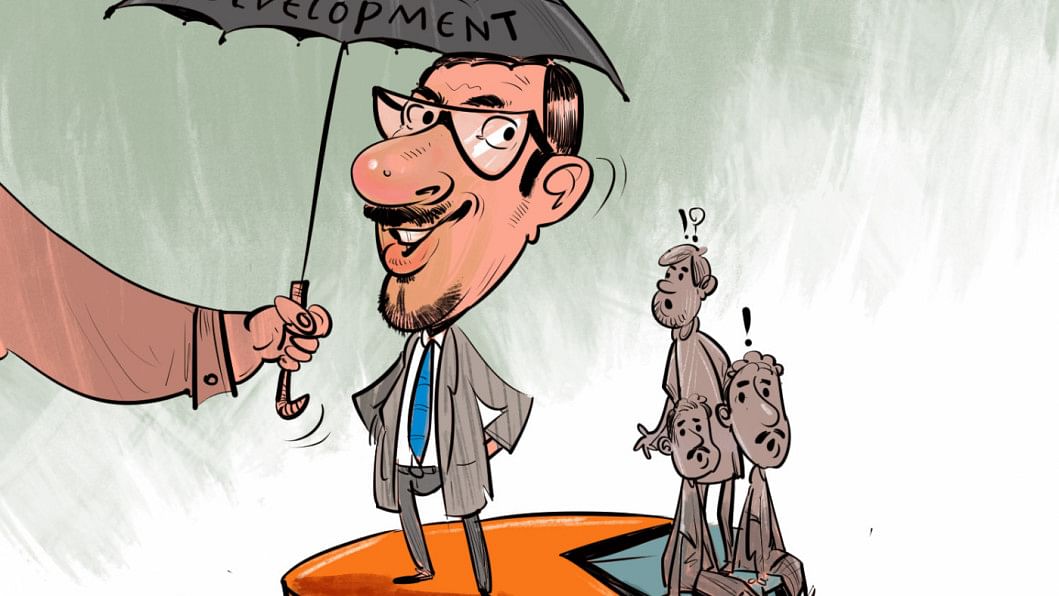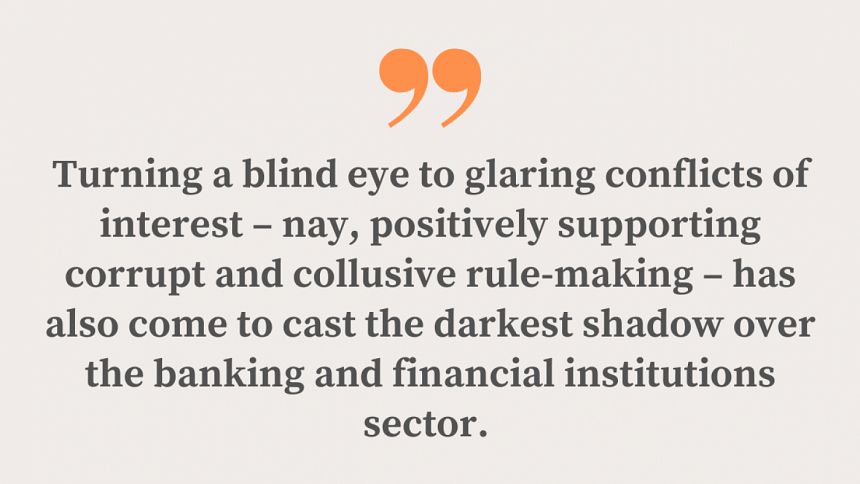‘Louha tribhuj’ and the political economy of development

On many development metrics, Bangladesh's performance and achievements have been justly recognised and feted at home and around the world. However, while the 50-year transformation scenario has indeed been robust, near-term trends have exposed systemic weaknesses, making the medium-term outlook decidedly shaky. While the immediate sense of macroeconomic breakdown has been tempered, the micro realities of poor and middle-class households struggling against a relentless cost-of-living crisis, and the meso realities of enterprise-level heightened uncertainty in growth outlook in critical subsectors, signal the entrenched presence of "bad days" for a majority of the population.
In May 2022, the fifth round of the PPRC-BIGD panel survey estimated the proportion of new poor to be 18.5 percent. Last week, the government's statistical agency at last acknowledged that the poverty rate had indeed gone up and now stood at 29.5 percent, compared to the pre-Covid level of 20 percent. But this rise in poverty numbers and the economic despair of an escalating number of the middle classes is only the visible tip of the crisis iceberg. The real worry is in the political economy of the policy landscape impacting both crisis management in the short term and growth management in the medium term.
Bangladesh has a vibrant public discourse on the state of the economy. However, what is frequently missing is a political economy lens and connecting the necessary dots.
Is corruption only a moral failure or does it flourish due to how rule-making, incentives, and sanctions are being politically constructed? Is the reluctance towards reforms only a question of inefficiency or is it dictated by the compulsion of protecting vested interests? Are implementation weaknesses a lack of capacity or are they due to how merit is systematically sidelined to the benefit of sycophancy? What indeed is the reality of economic governance?
We have always had deficits in our economic governance. But over the last decade, the political economy of the policy landscape has morphed into something more structural. A louha tribhuj, or an iron triangle, of three tendencies has come to define and limit the policy landscape.
The first part of the louha tribhuj is a one-sided vision of development. Infrastructure has become the "be all and end all" of development, with social development pushed to the sidelines. This is not to say that "social" is out of budgetary attention. But even in "social," all the attention is on the hardware, with software out of sight. School-building has become more important than the quality of education. Hospital-building has become more important than the quality of healthcare. Standalone infrastructures without attention to integration with other parts of the infrastructure network is leading to plummeting liveability and productivity of urban centres. Focus is on the concrete only, without commensurate attention to user protocols, maintenance and infrastructure governance.
The consequences of this one-sided focus are all too familiar: shocking lack of road safety and unpredictability of travel; drop in the quality of educational experience; healthcare becoming a reality of galloping costs without results.
The second part of the iron triangle is the rampant spread of conflict-of-interest-driven policy-making. Boundaries of public and private interests are constantly transgressed in the policy landscape in favour of private interests closely aligned with ruling groups. Flouting of rules and, in some cases, rules specifically designed for narrow private interests have shockingly become the norm in critical and remunerative sectors such as finance, banking, energy, transportation, ICT, and infrastructure. Such collusive "contact and contracts" have become brazen and become a structural property of today's economic governance.
Some sectoral examples make the above abundantly clear. Quick rental electricity plants were adopted as a short-run option to address load-shedding. But why has it continued far beyond the initial timeline, with a relentless expansion of installed capacity without required investment in distribution infrastructure and primary energy supplies? Why was gas exploration deliberately sidelined for a disastrous overdependence on expensive LNG import? Why has the state agency Bapex been systematically sidelined in favour of a foreign firm in Bhola gas fields, as a glaring example? No wonder capacity charges have emerged as the brazen face of planned inefficiency and corrupt collusion, dictated not by economics but by political economy.

A similar story holds sway in the most catalytic of economic sectors – namely transportation. Primacy of narrow politically-connected private interests have become a structural barrier not only to road governance, but also to the economics of transportation impacting travel time, onerous formal and informal costs of travel, and rampant failures in road safety. The BRTC has been rendered a perennially sick state-owned enterprise, route permit allocation is dominated by a transport owners' oligopoly standing in the way of both road safety and sector efficiency, and the BRTA is nowhere near rising up to its stewardship role. Rule-flouting private interests are effectively being given the immunity to continue the misgovernance stalemate.
Turning a blind eye to glaring conflicts of interest – nay, positively supporting corrupt and collusive rule-making – has also come to cast the darkest shadow over the banking and financial institutions sector. The pillars of finance sector governance are either over-eager to pander to selected private interests, or conspicuously inactive in their regulatory and supervisory responsibilities that has led to astounding levels of fraud and corruption. The case of PK Halder has perhaps become emblematic of such entrenched institutional culpable misgovernance.
The consequence of such corrupt and collusive rule-making is neither vague nor inconsequential with the most serious impact on competitiveness of the economy. Our exports-to-GDP ratio – one measure of competitiveness – has halved over 2012-22, from 20 percent to 10.6 percent. The continued stagnation in the private investment-to-GDP ratio is another cause for worry. Most recently, collusive regulatory moves appear to have unnerved external investors in the stock market. In such an amoral world, the "good entrepreneur" is effectively left adrift with a herculean uphill task.
The grip of the "iron triangle" works differently, but no less negatively in the case of development projects, particularly infrastructure projects. E-tender was supposed to have brought in transparency and efficiency to the whole process of awarding contracts, but reality speaks otherwise. Corrupt, inefficient and collusive practices work here through informal barriers to competitive bids, inflated costs, post-approval cost escalations, and project delays.
The third part of the louha tribhuj is the obicharer orthoniti – the economics of injustice rooted in policy marginalisation of all those lacking political voice, including workers, farmers, small entrepreneurs, and now even the middle classes. Not one member of the common masses sits idle, relentless in their effort and labour for whatever opportunities come their way, but the benefits of policy attention is disproportionately faced away from them towards a small number of favoured groups. Public transport, prices of essentials, utility costs, affordable housing, access to quality healthcare and education, access to green spaces – each of these pillars of quality living, central to the welfare of the common people, lacks the level of policy attention that would make a difference. It is as if the common masses have to shoulder the burden of resilience while fruits of growth flow disproportionately to favoured groups.
The second face of the economics of injustice is equally concerning. All our discussions are around macroeconomic imbalances and the ensuing crisis. Yet, we also need to keep in focus our medium-term goal of achieving the SDGs. In at least three areas, there is a real danger of reversal with Bangladesh becoming off track in SDGs: nutritional deficits (with nutritious items disappearing from the household diet due to lack of affordability), rise in secondary dropout level, and rise of youth unemployment (particularly, educated youth unemployment).
Bangladesh may be at an inflexion point in its development journey. Plenty of other initially successful countries fell into the "middle-income trap" because warning signals were not heeded and reform needs were pushed under the carpet. Will Bangladesh be able to recognise the louha tribhuj for what it is – a vicious triangle of mutually reinforcing policy tendencies that has morphed into a structural barrier straddling Bangladesh's inclusive and sustainable development aspirations? This cannot be overcome or dislodged merely by technical recommendations and feel-good talk. The need of the hour is a dismantling of the louha tribhuj through a qualitative change in political realisation, political approach and political will, and an urgent big push on reforms.
Hossain Zillur Rahman, an economist and political sociologist, is the executive chairman of Power and Participation Research Centre (PPRC).

 For all latest news, follow The Daily Star's Google News channel.
For all latest news, follow The Daily Star's Google News channel. 






Comments